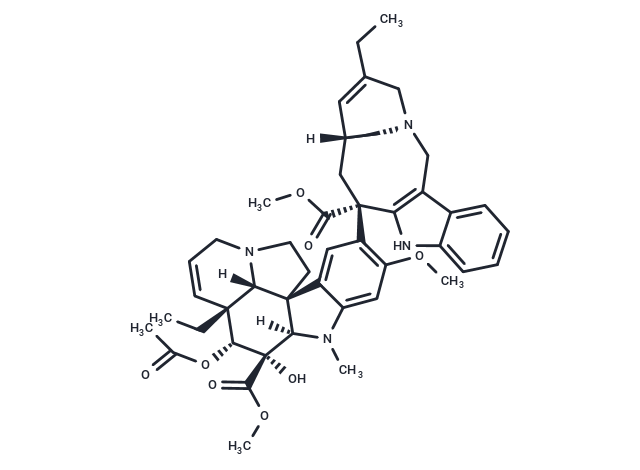购物车
- 全部删除
 您的购物车当前为空
您的购物车当前为空

Vinorelbine (KW-2307 base) 是一种半合成的长春花生物碱。它与微管蛋白结合并阻止有丝分裂纺锤体的形成,导致中期肿瘤细胞生长停滞。

Vinorelbine (KW-2307 base) 是一种半合成的长春花生物碱。它与微管蛋白结合并阻止有丝分裂纺锤体的形成,导致中期肿瘤细胞生长停滞。
| 规格 | 价格 | 库存 | 数量 |
|---|---|---|---|
| 20 mg | ¥ 510 | 现货 | |
| 1 mL x 10 mM (in DMSO) | ¥ 440 | 现货 |
| 产品描述 | Vinorelbine (KW-2307 base) is a semisynthetic vinca alkaloid. Vinorelbine binds to tubulin and prevents the formation of the mitotic spindle, resulting in the arrest of tumor cell growth in metaphase. |
| 靶点活性 | Proliferation (Hela cells):1.25 nM |
| 体外活性 | 浓度为 1.25 nM 的Vinorelbine (0.5-5 nM)可抑制细胞增殖 50%(IC50)。浓度为 8 nM 的Vinorelbine 不会使细胞进入无丝分裂期[1]。Vinorelbine 在雄激素依赖型(AD)和独立型(AI)前列腺癌细胞系中具有时间依赖性,可诱导 p53 和 p21WAFI/CIP1 的表达。Vinorelbine 以浓度依赖性方式刺激报告基因[2]。 |
| 体内活性 | 在接受Vinorelbine 治疗后,第一次中性粒细胞减少发生在第一次(4 只狗)、第二次(1 只)或第六次(1 只)Vinorelbine 治疗之后[3]。肿瘤猫对Vinorelbine 的耐受性为每周一次,MTD 为 11.5 mg/m2[4]。 |
| 激酶实验 | Reverse transcriptase assays: Reverse transcriptase assays are carried out in a reaction mixture (50 μL) containing 50 mM Tris-HCl (pH 7.5), 5 mM DTT, 100 mM potassium chloride, 0.01% Triton X-100 or NP40, 10 μg/ml (dT)15.(A)n as template primer and [3H] deoxythymidine triphospahate. The reaction mixture is incubated for 1 hr at 37 ℃ and stopped by the addition of 50 μg of yeast tRNA and 2 mL of 10% solution of trichloroacetic acid containing 1 mM sodium pyrophosphate. The samples are filtered on filters (0.45 μm), washed first with 5% TCA solution for 5 times and then with 2 ml of 70% ethanol. The filters are dried, scintillation fluid is added and the radioactivity counted in a counter. |
| 别名 | 长春瑞宾, KW-2307 base |
| 分子量 | 778.93 |
| 分子式 | C45H54N4O8 |
| CAS No. | 71486-22-1 |
| Smiles | C(C)[C@@]12[C@]3([C@@]4([C@]([C@](C(OC)=O)(O)[C@@H]1OC(C)=O)(N(C)C=5C4=CC(=C(OC)C5)[C@]6(C(OC)=O)C7=C(C=8C(N7)=CC=CC8)C[N@@]9C[C@](C6)(C=C(CC)C9)[H])[H])CCN3CC=C2)[H] |
| 密度 | 1.36 g/cm3 |
| 存储 | store at low temperature,keep away from direct sunlight | Powder: -20°C for 3 years | In solvent: -80°C for 1 year | Shipping with blue ice. | ||||||||||||||||||||||||||||||||||||||||
| 溶解度信息 | H2O: 10 mg/mL (12.84 mM), Sonication is recommended. DMSO: 100 mg/mL (128.38 mM), Sonication is recommended. | ||||||||||||||||||||||||||||||||||||||||
溶液配制表 | |||||||||||||||||||||||||||||||||||||||||
H2O/DMSO
DMSO
| |||||||||||||||||||||||||||||||||||||||||
以上为“体内实验配液计算器”的使用方法举例,并不是具体某个化合物的推荐配制方式,请根据您的实验动物和给药方式选择适当的溶解方案。
评论内容